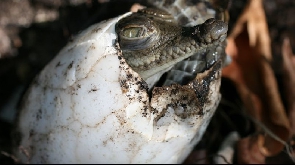 Virgin births for crocodiles fit dey common, researchers tok.
Virgin births for crocodiles fit dey common, researchers tok.
Authorities for zoo in Costa Rica don identify first case of one crocodile wey give herself belle.
She bin produce foetus wey be 99.9% genetically identical to herself.
Di case of so-called "virgin birth" dey shele for species of birds, fish and oda reptiles, but never before for crocodiles.
Di scientists say di trait dey inherited from one evolutionary ancestor, so dinosaurs fit also dey capable of self-reproduction.
Na one 18-year-old female American crocodile for Parque Reptilania lay di egg for January 2018.
Di foetus inside dey fully formed but na stillborn and so e no hatch.
Di crocodile wey lay di egg dey obtained wen she be two years old.
Dem keep am apart from oda crocodiles for her entire life.
E fit be Parthenogenesis'
Sake of say di crocodile dey seperated from odas, di park scientific team bin contact one US team from Virginia Polytechnic, wey specialise for virgin births.
For science virgin births dey known as parthenogenesis.
Parthenogenesis na reproductive strategy wey involve development of female (rarely male) gamete (sex cell) wen no dey fertilize.
Dey analyse di foetus and find say e dey more dan 99.9 % genetically identical to im mama- dis one confam say e no get papa.
For writing inside di Royal Society journal Biology Letters, di researchers say virgin births fit dey more common among crocodiles, and don go unnoticed until now sake of say pipo never dey look for cases of dem.
E fit don happun before
"E no dey uncommon for captive reptiles to lay clutches of eggs, if we reason di period wey e take isolate from mates, dis go normally dey considered say e no fit live and dey discarded.
Sake of dat, di findings suggest say eggs suppose dey assessed for potential viability wen males dey absent," di scientists tok for dia research paper.
"Furthermore, sake of say (virgin births) fit happun for presence of potential mates.
Dis kind instance fit dey missed when reproduction happun wen females dey co-habit wit males".
E no dey clear why parthenogenesis dey happun for different species, but occurrences dey crop up for di scientific literature more often.
E fit be sake of say researchers now look for am.
One theory be say e dey happun for species wey dey capable of parthenogenesis wen numbers go down, and dey don nearly finish for earth.
"Dis new evidence offer one interesting clear understanding of di possible reproductive capabilities of relatives of crocodiles wey don finish for earth," di scientists write, "particularly dinosaurs".